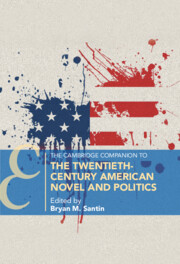Book contents
- The Cambridge Companion to the Twentieth-Century American Novel and Politics
- The Cambridge Companion to the Twentieth-Century American Novel and Politics
- Copyright page
- Dedication
- Contents
- Chronology
- Introduction
- Part I Ideologies and Movements
- Part II The Politics of Genre and Form
- Chapter 8 Crime Fiction
- Chapter 9 Science Fiction
- Chapter 10 Western Fiction
- Chapter 11 Literary Realist Fiction
- Chapter 12 Immigrant Fiction
- Chapter 13 Gothic Horror Fiction
- Chapter 14 Postmodern Metafiction
- Part III Case Studies
- Further Reading
- Index
- Cambridge Companions To …
Chapter 10 - Western Fiction
from Part II - The Politics of Genre and Form
Published online by Cambridge University Press: 07 October 2023
- The Cambridge Companion to the Twentieth-Century American Novel and Politics
- The Cambridge Companion to the Twentieth-Century American Novel and Politics
- Copyright page
- Dedication
- Contents
- Chronology
- Introduction
- Part I Ideologies and Movements
- Part II The Politics of Genre and Form
- Chapter 8 Crime Fiction
- Chapter 9 Science Fiction
- Chapter 10 Western Fiction
- Chapter 11 Literary Realist Fiction
- Chapter 12 Immigrant Fiction
- Chapter 13 Gothic Horror Fiction
- Chapter 14 Postmodern Metafiction
- Part III Case Studies
- Further Reading
- Index
- Cambridge Companions To …
Summary
This chapter suggests that the chief subject of Western genre fiction is the politics of individual freedom. Novels that take the American West as their principal setting and subject, such as Owen Wister’s The Virginian (1902), Zane Grey’s Riders of the Purple Sage (1912), Louis L’Amour’s Hondo (1953), Larry McMurtry’s Lonesome Dove (1985), and Cormac McCarthy’s Blood Meridian (1985), along with short stories such as Annie Proulx’s “Brokeback Mountain” (1997), ask questions that are fundamentally about liberalism. The chapter suggests that early genre Westerns tend to imagine the American West as a romantic space of absolute individual autonomy, whereas post-1970s Westerns reimagine the genre with a critical eye, as if to acknowledge the myriad ways in which the frontier myth was too often a cover story for conquest. Over the course of its twentieth-century invention and reinvention, one persistent feature of the Western genre was the many ways in which it positioned the signifiers of the West in order to imagine individualism in America.
Keywords
- Type
- Chapter
- Information
- Publisher: Cambridge University PressPrint publication year: 2023

